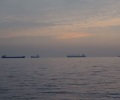IMO adopts carbon reduction metrics but defers discussion of carbon levy

An International Maritime Organization committee has adopted mandatory measures to reduce ships’ carbon intensity and to grade their achievements in this regard, although some industry stakeholders and observers are concerned the body has not gone far enough.
A proposal by the Marshall Islands and Solomon Islands to introduce a levy of $100/mt of CO2 equivalent on oil used as a bunkering fuel was not adopted by the IMO’s Marine Environment Protection Committee. This is due to be discussed at an intersessional working group in October.
Container giant AP Moller-Maersk, whose own ambitious climate targets outstrip those of the IMO, said it welcomed the short-term measures and added that it hopes they will enable the IMO to agree on a market-based measure by 2025.
“A carbon price as part of a global market-based measure is needed as a matter of urgency to secure the uptake of renewable fuels,” Simon Bergulf, head of regulatory affairs at Maersk, said in a statement.
Others have suggested still more stringent market-based measures. Trafigura, an independent oil trader and one of the world’s largest ship charterers, has proposed that the IMO introduce a carbon levy of $250-$300/mtCO2e on shipping fuels, to make zero- and low-carbon fuels more economically viable and more competitive.
S&P Global Platts assessed voluntary CORSIA-eligible carbon (CEC) credits at $2.59/mtCO2e June 17.
MEPC, which sat June 10-17, also looked at a proposal to establish an International Maritime Research Board, funded by a levy on oil used by shipping, but this will now need to wait for further discussion at the MEPC’s next session in November.
Bergulf said he was happy to see the decarbonization fund will be discussed at the next MEPC session, “but would also like to stress that the RD&D is needed in the short term and not at the end of this decade.”
The measures that MEPC passed will require all ships to calculate their Energy Efficiency Existing Ship Index (EEXI) to improve their energy efficiency and to establish their annual operational carbon intensity indicator (CII). Vessels will get a rating of A-E, where A is the best.
The amendments, initially agreed by a working group last year, are expected to enter into force on Nov. 1, 2022, with the requirements for EEXI and CII certification coming into effect from Jan. 1, 2023. This means that the first annual reporting will be completed in 2023, with the first rating given in 2024.
Market-based measures aside, some said the amendments did not go far enough.
“Whilst Maersk welcomes the adoption of the short-term measures, the metrics to be used for their implementation are still unclear and this means that their effect remains to be seen,” Bergulf said.
NGO Transport & Environment was more damning. In a statement, it said that MEPC’s amendments mean the global shipping fleet will be required to reduce its carbon intensity by just 1.5% a year.
“The target is as weak as what would be achieved under business as usual and falls far short of the 7% annual reduction required to meet the goals of the Paris agreement,” it added.
According to the Fourth IMO Greenhouse Gas Study, published in August, GHG emissions from shipping have increased to over 1.076 billion mt in 2018 from 977 million mt in 2012.
The share of shipping emissions in global anthropogenic emissions rose from 2.76% in 2012 to 2.89% in 2018.
MEPC’s latest amendments count as short-term measures, with the IMO’s long-term targets not having yet been changed. These are a 40% reduction in carbon intensity in the global fleet by 2030 compared with 2008 and a 50% reduction in greenhouse gas emissions by 2050.
Source: Platts

 Hellenic Shipping News Worldwide Hellenic Shipping News Worldwide, Online Daily Newspaper on Hellenic and International Shipping
Hellenic Shipping News Worldwide Hellenic Shipping News Worldwide, Online Daily Newspaper on Hellenic and International Shipping





















 PG-Software
PG-Software